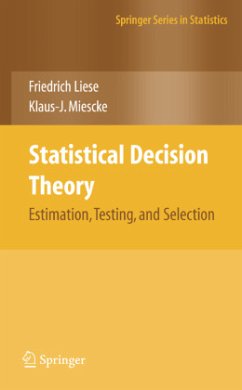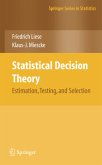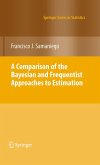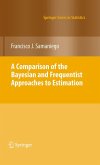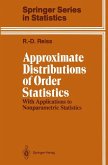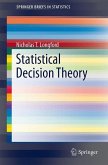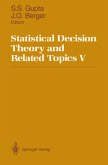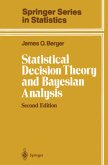For advanced graduate students, this book is a one-stop shop that presents the main ideas of decision theory in an organized, balanced, and mathematically rigorous manner, while observing statistical relevance. All of the major topics are introduced at an elementary level, then developed incrementally to higher levels. The book is self-contained as it provides full proofs, worked-out examples, and problems. The authors present a rigorous account of the concepts and a broad treatment of the major results of classical finite sample size decision theory and modern asymptotic decision theory. With its broad coverage of decision theory, this book fills the gap between standard graduate texts in mathematical statistics and advanced monographs on modern asymptotic theory.
This monograph is written for advanced Master's students, Ph.D. students, and researchers in mathematical statistics and decision theory. It should be useful not only as a basis for graduate courses, seminars, Ph.D. programs, and self-studies, but also as a reference tool. Attheveryleast,readersshouldbefamiliar withbasicconceptscoveredin both advanced undergraduate courses on probability and statistics and int- ductory graduate-level courses on probability theory, mathematical statistics, and analysis. Most statements and proofs appear in a form where standard arguments from measure theory and analysis are su?cient. When additional information is necessary, technical tools, additional measure-theoretic facts, and advanced probabilistic results are presented in condensed form in an - pendix. In particular, topics from measure theory and from the theory of weak convergence of distributions are treated in detail with reference to m- ern books on probability theory, such as Billingsley (1968), Kallenberg (1997, 2002), and Dudley (2002). Building on foundational knowledge, this book acquaints readers with the concepts of classical ?nite sample size decision theory and modern asymptotic decision theory in the sense of LeCam. To this end, systematic applications to the ?elds of parameter estimation, testing hypotheses, and selection of po- lations are included. Some of the problems contain additional information in order to round o? the results, whereas other problems, equipped with so- tions, have a more technical character. The latter play the role of auxiliary results and as such they allow readers to become familiar with the advanced techniques of mathematical statistics.
This monograph is written for advanced Master's students, Ph.D. students, and researchers in mathematical statistics and decision theory. It should be useful not only as a basis for graduate courses, seminars, Ph.D. programs, and self-studies, but also as a reference tool. Attheveryleast,readersshouldbefamiliar withbasicconceptscoveredin both advanced undergraduate courses on probability and statistics and int- ductory graduate-level courses on probability theory, mathematical statistics, and analysis. Most statements and proofs appear in a form where standard arguments from measure theory and analysis are su?cient. When additional information is necessary, technical tools, additional measure-theoretic facts, and advanced probabilistic results are presented in condensed form in an - pendix. In particular, topics from measure theory and from the theory of weak convergence of distributions are treated in detail with reference to m- ern books on probability theory, such as Billingsley (1968), Kallenberg (1997, 2002), and Dudley (2002). Building on foundational knowledge, this book acquaints readers with the concepts of classical ?nite sample size decision theory and modern asymptotic decision theory in the sense of LeCam. To this end, systematic applications to the ?elds of parameter estimation, testing hypotheses, and selection of po- lations are included. Some of the problems contain additional information in order to round o? the results, whereas other problems, equipped with so- tions, have a more technical character. The latter play the role of auxiliary results and as such they allow readers to become familiar with the advanced techniques of mathematical statistics.
From the reviews:"The central theme of this book is 'what optimal decisions are in general and in specific decision problems, and how to derive them'; optimality is understood in terms of the expected loss, i.e. the risk functional, or some function of it.... This monograph is, undoubtedly, a significant event in the development of statistical decision theory." (Yurij S. Kharin, American Mathematical Society, Mathematical Reviews on the Web, MR2421720)"This book is unique in offering a fuller point of view of selection rules,.... An other feature is that is combines innovation and tradition. This monograph uniquely synthesizes otherwise disparate materials, while establishing connections between classical and modern decision theory. Actually it creates a bridge between the classical results of mathematical statistics and the modern asymptotic decision theory.... also provides a broad coverage of both the frequentist and the Bayes approaches in decision theory." (2009 European Mathematical Society, FIZ Karlsruhe & Springer-Velag, ZBl 1154.62008)"The central theme of this book is the nature of optimal decisions, in both general and specific problems, and how to reach them. ... This is a deep theoretical and mathematical presentation of decision theory, which I imagine will become a leading reference work for researchers in the area." (David J. Hand, International Statistical Review, Vol. 76 (3), 2008)"This monograph is written not only as a basis for graduate courses, but also as a reference tool. Readers should be familiar with basic concepts of probability theory, mathematical statistics, and analysis. ... This book also provides a broad coverage of both the frequentist and the Bayes approaches in decision theory. The Bayes approach is considered to be a useful decision-theoretic framework among others, and it is used heavily throughout the book ... ." (R. Schlittgen, Zentralblatt MATH, Vol. 1154, 2009)"The authors characterize this book as a monograph intended for graduate students in mathematical Statistics. As such, it should be suitable as the basis for an advanced class in decision theory. ...The book's coverage is both comprehensive and general. ...a solid addition to the literature of decision theory from a formal mathematical statistics approach. ..." ((Journal of the American Statistical Association, September 2009, Vol. 104, No. 487)

